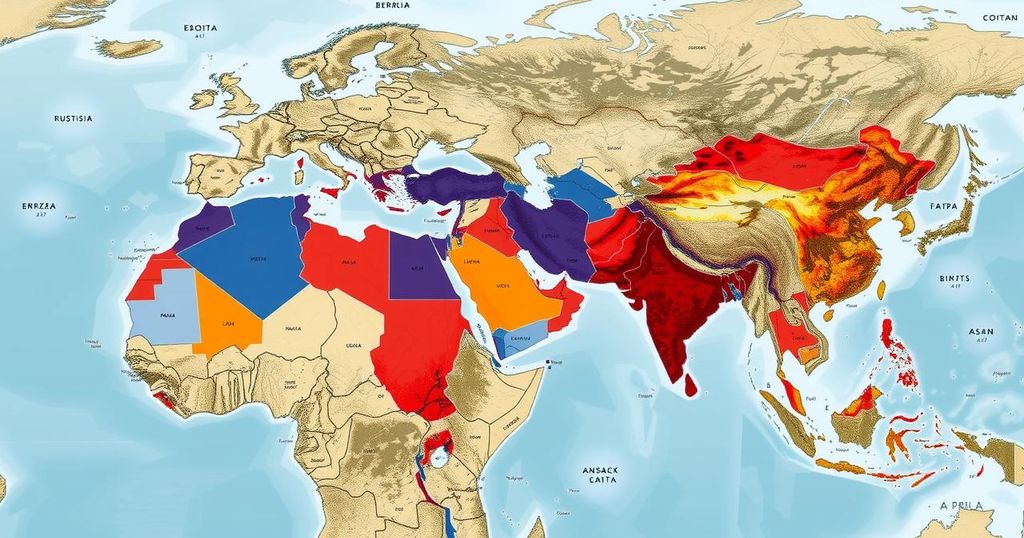The Declining Power of Russia in Africa

Russia’s military influence in Africa is weakening due to overstretched operations, particularly through the Wagner mercenary group, which has faced significant setbacks and rising civilian casualties. The Kremlin’s propaganda portrays a narrative of strength, yet the realities on the ground show increasing violence and ineffective governance. Recent shifts toward new defense partnerships by local governments underscore the diminishing impact of Russian support, compounded by economic challenges.
Russia’s presence in Africa is increasingly seen as overstretched and ineffective, particularly regarding its military engagements with groups like the Wagner mercenaries. Despite employing strong propaganda to project itself as a great power aiding African nations, the operational realities on the ground tell a different story. In places such as Mali, Russia’s strategies initially disrupted existing Western alliances but ultimately led to increased violence against civilians and significant loss of life among Russian forces. Compounding this situation, local governments are beginning to reassess their reliance on Russian support, coinciding with operational setbacks in regions like Syria, where Moscow’s commitments are stretched thin due to its ongoing conflict with Ukraine. This dichotomy highlights an emerging perception that Russia may not fulfill its promises of protection or support, diminishing its influence across the continent.
In Mali, for instance, initial interventions by Russian forces led to anti-Western sentiment among the populace, contributing to political upheaval. However, as they engaged in brutal confrontations, evidence suggested increased civilian casualties rather than stability. Reports indicate that Wagner troops were implicated in egregious human rights violations, including mass executions and widespread sexual violence.
Moreover, following recent military losses, the Malian junta appears to be moving towards diversifying its defense collaborations, showing interest in Turkish military assistance instead. The shift towards Turkey, coupled with the Russian group’s struggles to maintain personnel and effectiveness, symbolizes a significant failing in Russia’s aspirations for increased influence in Africa. The diminishing perception of Russian power is echoed in its economic engagements as well, with sanctions impacting trade and investment levels inadequate to compete with the support offered by Western nations. In essence, the veneer of power that Moscow has sought to showcase is beginning to crumble, revealing a less formidable presence in Africa than initially perceived.
As Russia maintains a focus on disinformation campaigns and establishing a presence in African media, the actual evidence of operational capability and humanitarian support remains limited. Ultimately, the juxtaposition between Russian propaganda and its operational failures presents a clearer assessment of Russia’s potential as a great power in Africa, illuminating a narrative that might no longer hold sway among the very nations it seeks to influence.
The article examines Russia’s influence and involvement in Africa, particularly through its military contractors such as the Wagner Group. Throughout the continent, Russia has sought to build alliances through regime protection in exchange for resource exploitation, projecting itself as a counterbalance to Western influence. However, recent events reveal that Russian forces are struggling amidst military setbacks and a diminishing reputation for stability and support, leading to a reassessment of their presence by local governments. The analysis underscores the complexities of Russian engagements, which are increasingly associated with violence, oppression, and questionable humanitarian efforts rather than productive partnerships.
In summary, Russia’s ambitions in Africa are facing substantial challenges due to operational missteps and rising local discontent. The effectiveness of its military engagements is hindered by rising violence and loss of life among its forces. As perceptions shift toward alternative partnerships, primarily with countries like Turkey, Russia’s influence is poised to decline further. Furthermore, economic limitations owing to sanctions compound its weakening position. Overall, Russia’s image as a great power in Africa appears increasingly hollow and unsustainable.
Original Source: foreignpolicy.com







